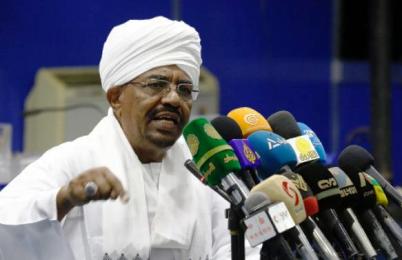President Bashir agrees to review S. Sudan oil transit fees: official
January 21, 2016 (KHARTOUM) – In the wake of the significant fall of oil prices in the international markets, the Sudanese president on Thursday accepted, to review the oil transit fees agreed upon with neighbouring South Sudan in September 2012.

The official did not, however, provide further details on the matter but said al- Bashir’s decision followed a request made by South Sudan’s foreign minister Barnaba Marial Benjamin.
SUNA had earlier released a news wire saying Bashir has “agreed today [Thursday] to reduce oil transit fees of the South Sudanese oil through the Sudanese territory”.
But later the news agency released another news indicating Bashir “directed to review”.
Officials in Khartoum said the measure aims to support the recovery of the new state after two years of war and it took into consideration the vertiginous drop in oil prices.
South Sudan said it has written to neighbouring Sudan, requesting it to make “rationale charges” in the wake of the current collapse in global oil prices.
“Yes, we have written to the government of Sudan to accept our request to re-evaluate the charges and reduce them to meet the current oil prices in the international market”, Marial told Sudan Tribune on Wednesday.
He added, “We are not threatening. We are asking for dialogue within which we are asking the government of Sudan to make rationale decision”.
The minister said he recently visited Khartoum to seek support from the Sudanese government over the implementation of the peace agreement, which the Juba government signed with the armed opposition last year.
“Sudanese people are passionate and I am sure they would understand. They have accepted to dialogue and our ministry of petroleum and other relevant institutions are already following these discussions,” said Marial.
“We are also at the level of the ministry following it with the Sudanese foreign ministry through the Sudanese ambassador here. So indeed there are discussions going on and I am sure these discussions will produce something positive and results will be in the two countries’ interest”, he added.
In August 2013, South Sudan agreed to pay to Khartoum $9.10 for the oil produced in Upper Nile state and $11 for that of Unity state which produces some 20% of South Sudan’s oil. Juba also agreed to pay the Transitional Financial Assistance (TFA) to the average of the agreed oil transportation fees.
However, South Sudan government had earlier asked Khartoum to cut the lease of Sudanese oil transportation facilities, arguing that its request was prompted by the current fall in oil prices on the international market.
The South Sudan’s Petroleum and Mining ministry said it may be forced to shut down its oil fields in Upper Nile state and turn off pipeline should the Sudanese government decline a request to lower its oil transit fees.
“We are left with no option at the moment rather than to shut it down because it’s not feasible. We cannot sell the oil at loss”, the ministry said in a memo sent to Sudan’s Ministry of Petroleum and Mining last week.
South Sudan currently produces 160,000 barrels of oil per day, despite a decline in its oil production due to the violent conflict that engulfed the world’s youngest nation.
South Sudan reportedly receives less than $5 per barrel from its oil when transit charges paid to Sudan are deduced and oil exploration companies are paid.
(ST)
